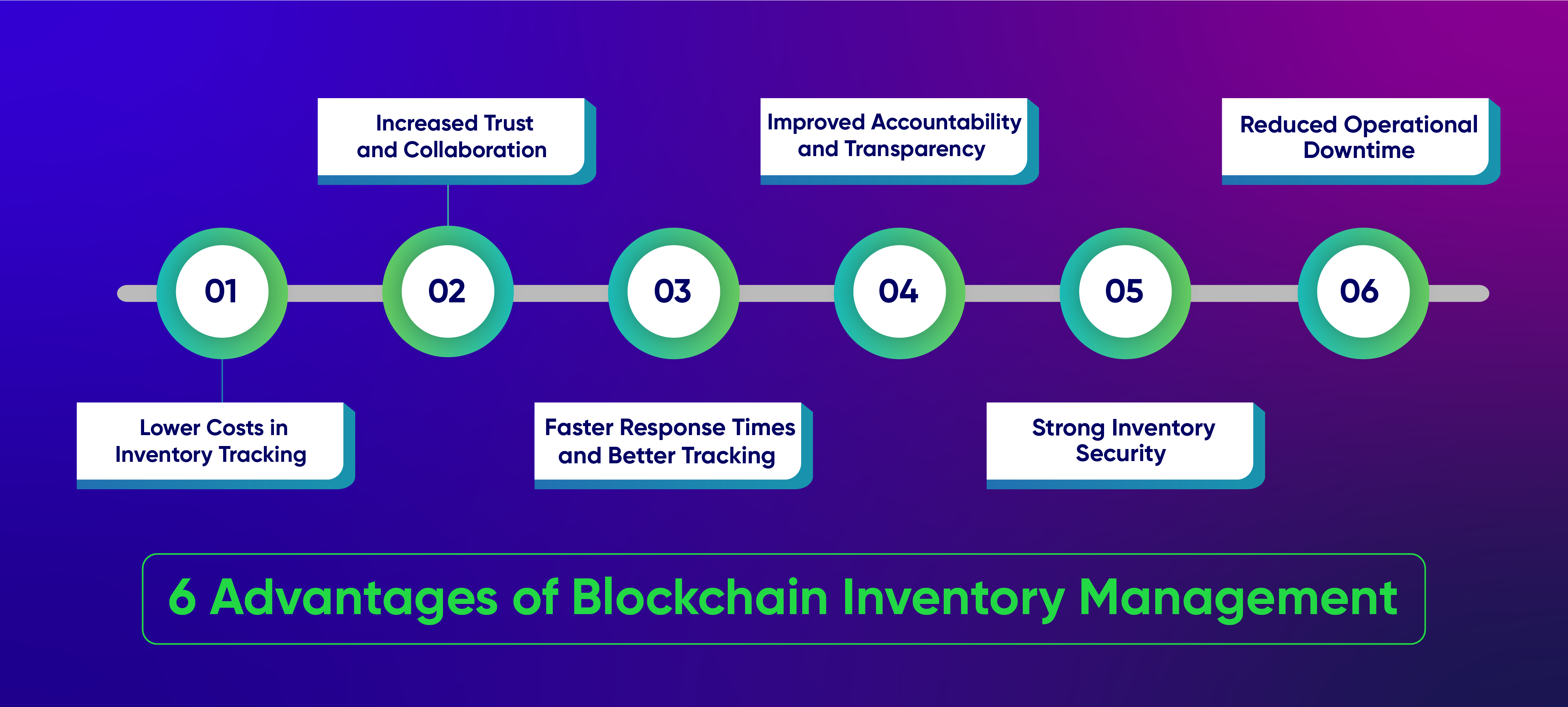
Introduction
Blockchain & Web3 Services Trusted By Leaders
- Develop innovative solutions using our state-of-the-art blockchain expertise.
- Achieve accelerated growth with robust & scalable Web3 consulting.
- Unlock 360-degree security with our top-rated blockchain development.
Blockchain Technology – The Future of Inventory Management
Managing inventory is a crucial part of any business that involves keeping track of a company’s products and materials. No matter what industry you’re in, it’s important to handle goods efficiently throughout their lifecycle to keep things running smoothly. However, supply chain management is a complex process, and you might face difficulties with the tasks of timely restocking of items and other operations. Luckily, blockchain technology has made these processes much easier. In particular, blockchain helps solve many inventory management problems in the supply chain. Keep reading the blog to find out how blockchain can improve your inventory management.Key Takeaways
- Inventory Management: Effective inventory management ensures smooth operations by tracking products from production to delivery, minimizing costs, and enhancing customer satisfaction.
- Blockchain for Inventory Management: Blockchain technology provides a secure, transparent ledger for tracking inventory in real time, improving data accuracy and stakeholder collaboration.
- Benefits of Blockchain: Blockchain enhances traceability, reduces costs, enhances trust, provides real-time updates, improves accountability, boosts security, and increases operational efficiency in inventory management.
What is a Blockchain Inventory Management System?
Blockchain-based inventory management system uses blockchain technology to track and manage inventory. It keeps a record of every product’s journey from production to the final consumer. This system offers transparency, security, and unchangeable records for inventory management. Using blockchain for inventory management provides higher accuracy and security compared to traditional systems. It helps streamline operations, reduce errors, and prevent fraud, making your supply chain more efficient.How Blockchain Inventory Management Software Works?
The process starts by creating a digital block for each product. Each block has important information like the item’s origin, production date, and various points it touches in the supply chain. These blocks are connected to form a permanent record that tracks the product’s journey from production to delivery. Unlike traditional methods, this system doesn’t have a central authority. You and other relevant parties in the supply chain can access the records and must agree to verify every entry added to the block. This decentralized approach increases transparency and trust among all involved. All parties update the digital ledger in real time with details such as shipping status, quality checks, and storage conditions. This ensures you have accurate and up-to-date information about the product’s location and condition. Additionally, it helps you quickly identify and fix any issues that arise from a specific source.How to Implement This Inventory Management System?
Knowing the right steps to implement blockchain inventory management can help you use the technology more effectively and improve your supply chain. Here are the steps to fully use this system in your operations.Choose Your Desired Platform
Pick a platform that fits your business’s specific needs. For easier implementation, consider its ability to scale, its data security features, and how well it works with your current systems. Also, make sure the blockchain integrates smoothly with your inventory management processes for an easy switch to blockchain-based solutions.Build a Network Infrastructure
Set up the network’s transmitter nodes for inventory management. The settings should include communication protocols and data-sharing agreements with key players in the supply chain.Implement the Process and Train Staff
Introduce your team to the new system through training sessions focused on effectively using the blockchain inventory management system (IMS). In a blockchain-based IMS, managing data is crucial for accurate and real-time information about your inventory. Train your employees on proper data entry, validation, and protocol sharing to ensure accuracy and avoid costly mistakes.Regularly Update and Maintain the System
A successful blockchain inventory management system needs regular updates and maintenance to keep the system running smoothly. This may include fixing vulnerabilities, upgrading the network, and ensuring data integrity. Continuous improvement ensures that the blockchain-based IMS remains efficient and secure.What to Look for in a Blockchain for Inventory Management?
Knowing how to implement blockchain for inventory management is just one part of optimizing its potential. Here are some key factors to consider when choosing a blockchain:-
Scalability
As your business grows, the blockchain should be able to handle more transactions and data without losing accuracy and security. It should meet your evolving inventory management needs.
-
Cost-effectiveness
Every activity on the blockchain has a transaction cost. High fees can reduce the benefits of blockchain technology. Additionally, the costs for hardware and software should not be too high. A good blockchain should offer valuable features while remaining affordable.
-
Interoperability
Blockchain’s real-time updates improve inventory management, even during challenges like raw material shortages. It should integrate seamlessly with essential systems like ERP software and payment gateways. ERP software centralizes data on sales, procurement, and inventory levels, enabling quick adjustments. Payment gateways enhance the security and transparency of financial transactions. The goal is to sync inventory and financial data for better control and management.
-
Transparency
Transparency is essential in a good blockchain for inventory management. Every transaction and change in inventory should be visible to all stakeholders. For example, public blockchains, like those from the BSV Association (BSVA), are open to anyone and allow stakeholders to validate transactions. This real-time view of inventory data reduces discrepancies, increases trust, and helps track the movement of goods to reduce errors and fraud.
Not all blockchains have these features, so it’s important to find one that matches your needs. The BSV Blockchain offers a solution for critical inventory management functions.6 Advantages of Blockchain Inventory Management
Using blockchain in inventory management offers many benefits to improve your supply chain.
-
Lower Costs in Inventory Tracking
Traditional methods of tracking inventory can be labor-intensive and prone to human error. Automating these tasks with blockchain can greatly reduce costs. It saves on labor expenses and minimizes mistakes like miscalculations or stock discrepancies. This efficiency leads to cost savings across the supply chain.
-
Increased Trust and Collaboration
In a blockchain system, everyone has access to the same data, reducing misunderstandings and disputes that can be costly in time and resources. Blockchain builds a transparent supply chain and unchangeable records create a secure environment for sharing information and coordinating activities. This improves collaboration among all parties involved.
-
Faster Response Times and Better Tracking
Blockchain-based inventory management systems provide real-time updates, allowing you to quickly identify and address critical issues like raw material shortages. The system records each interaction instantly, from procurement to distribution, so you can pinpoint the location and status of materials, identify potential delays, and quickly mobilize resources to address shortages. This leads to better efficiency and customer satisfaction.
-
Improved Accountability and Transparency
Every transaction is recorded on the blockchain, making it easy to trace and attribute to the responsible party. Stakeholders have access to the same information, promoting clear communication and trust. This level of accountability reduces disputes and helps identify the root cause of any issues immediately.
-
Strong Inventory Security
In today’s world of frequent data breaches and cyber threats, high-level security is crucial. Blockchain-based systems protect your data with their decentralized nature, requiring consensus from nodes before confirming transactions. This makes it nearly impossible to tamper with records and eliminates the risk of a single point of failure in traditional systems. Additionally, blockchain uses encryption techniques to safeguard inventory data from unauthorized access and cyberattacks.
-
Reduced Operational Downtime
Unlike traditional systems that rely on a central authority, blockchain operates on a network of nodes. This decentralized approach makes the system more resilient and reliable. Even if one part of the network has issues or downtime, the rest of the system remains operational with minimal disruptions, ensuring continuity in supply chain processes.
Transforming Inventory Management with Blockchain
Managing inventory effectively is a common challenge for businesses in various industries. However, blockchain technology offers a way to simplify and improve this process. By using blockchain in your inventory management, you can enhance the flow of products through your supply chain. This leads to better customer satisfaction as your products reach end-users more quickly. To achieve this, it’s important to choose the right technology partner for your inventory management needs. BloxBytes is a leading technology company that has been working in the blockchain software development domain for years. We can develop customized solutions that can help you streamline your inventory management operations and achieve better results in a reduced time period.Frequently Ask Question
-
What is blockchain-based inventory management?
Blockchain-based inventory management system tracks and manages inventory faster and more efficiently. It records every product’s journey from production to delivery, offering transparency, security, and real-time updates throughout the supply chain.
-
How does blockchain improve inventory management?
Blockchain improves inventory management by providing a transparent and immutable record of each transaction. This reduces errors, prevents fraud, and ensures all stakeholders have access to the same accurate information, leading to better collaboration and efficiency.
-
What are the key benefits of using blockchain for inventory management?
The key benefits include reduced costs due to automation, enhanced trust and collaboration among stakeholders, faster response times through real-time tracking, improved accountability and transparency, strong security measures, and reduced operational downtime due to the decentralized nature of blockchain.
-
What challenges can blockchain help overcome in inventory management?
Blockchain can help overcome several challenges in inventory management, including reducing human error in tracking, preventing fraud through secure and immutable records, enhancing transparency and trust among stakeholders, and providing real-time updates to quickly address issues like shortages and delays.